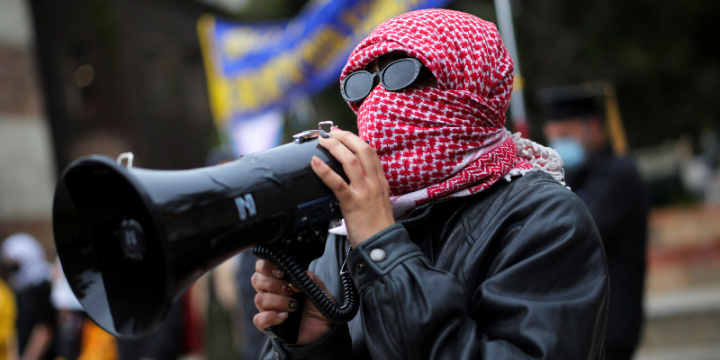A pro-Hamas demonstrator uses a bullhorn during a protest at the University of California Los Angeles (UCLA) on March 11, 2025. Photo: Daniel Cole via Reuters Connect.
The Columbia Journalism Review, the official organ of Columbia University’s Graduate School of Journalism, recently published a round table discussion on press freedom in Gaza and Israeli restrictions on foreign journalists entering Gaza.
This was not, however, an academic and nuanced discussion on such hot-button topics. Rather, it was an orgy of radical voices accusing Israel of the most heinous crimes, dismissing any connection between certain Gazan journalists and Hamas, and ignoring the role that Hamas plays in obstructing press freedom in Gaza.
Urgent ideas for defending press freedom in Gaza, the world’s deadliest place for journalists. By @AzmatZahra, @MeghnadBose93, and @laur_watso. https://t.co/tMUN4F3oIl pic.twitter.com/bM6WPezgfI
— Columbia Journalism Review (@CJR) August 18, 2025
The tone of this piece was immediately set by the introductory remarks by Azmat Khan, the initiator of this discussion, and both an assistant professor of journalism and the director of the Simon and June Li Center for Global Journalism at Columbia Journalism School.
Khan engages in a blistering diatribe against Israeli actions in Gaza, accusing the Jewish State of committing genocide, purposefully targeting Gazan journalists in order to stop them from reporting on the war, and manufacturing a “man-made human catastrophe in Gaza.”
Khan dismisses Israeli allegations that certain Gazan journalists and media workers that were moonlighting as terrorists as “poorly evidenced accusations that someone Israel killed was a combatant, rather than well-documented evidence of that person’s work as a reporter” and also goes after “pro-Israel advocacy groups that dub themselves ‘media watchdogs’ and wage systematic campaigns, fomented by Israeli intelligence, to discredit, dehumanize, and blacklist them—and to harass those who defend them.”
There is no doubt that Khan had HonestReporting in mind on that last point, after we exposed the terror links of certain Palestinian journalists in Gaza and how Hamas frames the narrative emerging from the coastal enclave.
Clearly, rather than engaging with the serious questions about the journalistic integrity of some Gazan reporters and media workers, Khan prefers to blindly absolve them of any wrongdoing and vilify those bringing these terror ties to light. This is not the work of an influential academic committed to truth and accuracy but of a propagandist obfuscating reality to serve a prepared narrative.
Khan’s ire then turned toward governments and news outlets, accusing them of turning a blind eye to Israel’s actions in Gaza and endangering the lives of Palestinian journalists.
It is here that Khan turned to a litany of “thinkers from across the fields of journalism, human rights, literature, academia, and advocacy,” asking for new strategies and ideas on how to promote “press freedom” in Gaza. With such a biased introduction, it is no surprise that the respondents all shared Khan’s animus towards Israel and placed all blame at the feet of the Jewish state, completely ignoring the terror organization that still exerts control inside the Gaza Strip.
Here are some of the most radical proposals and claims that were put forward in this piece:
- Sharif Abdel Kouddous, the Middle East and North Africa editor for Drop Site News (an alternative news organization that has no problem parroting Hamas talking points and sympathizing with the terror group), suggested journalists strike until media organizations include a disclaimer that Israel is responsible for the most journalist deaths around the world. He said the veracity of any Israeli statement “is dubious.”
- Arwa Damon, a former CNN correspondent who was quick to contextualize Hamas’ October 7 attacks, recommended “banning Israeli government and military voices from air and print until they let the press into Gaza.”
- Activist and journalist Mohammed El-Kurd, no stranger to misinformation and bending the truth, suggested a flotilla or march of foreign journalists to Gaza.
- Lila Hassan, an independent journalist, accused the media of favoring the Israeli narrative and not questioning it, thus violating media ethics.
- Assal Rad, a media critic, urged journalists and media organizations to platform Palestinian voices from inside Gaza and to stop treating Israeli government statements as “a reliable source of information.”
- Similarly, Diana Buttu, a former spokesperson for the PLO, called on journalists to stop “interviewing or giving space” to Israeli spokespeople.
- Abubaker Abed, a Palestinian journalist who glorifies Hamas and incites violence, suggested that media organizations should hire more Gazan journalists and pay them double the current rate while also providing cover for them in the international arena.
The publication of such a one-sided piece in an elite university’s journalism review calls into question the ethics and standards that are being taught to budding journalists. What hope is there for journalistic standards to be maintained in future reporting on Israel and the Palestinians if this is the approach taken by those who are tasked with influencing the next generation of journalists?
The author is a contributor to HonestReporting, a Jerusalem-based media watchdog with a focus on antisemitism and anti-Israel bias — where a version of this article first appeared.
Click this link for the original source of this article.
Author: Chaim Lax
This content is courtesy of, and owned and copyrighted by, https://www.algemeiner.com and its author. This content is made available by use of the public RSS feed offered by the host site and is used for educational purposes only. If you are the author or represent the host site and would like this content removed now and in the future, please contact USSANews.com using the email address in the Contact page found in the website menu.





